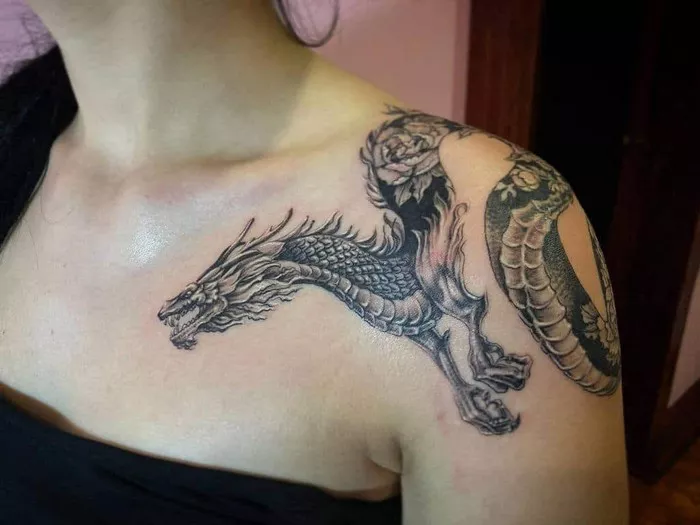Japan, renowned for its rich culture and deep-rooted traditions, has long fascinated people worldwide. Among the myriad facets of Japanese culture, tattoos stand out as both an art form and a symbol with intricate cultural significance. However, amidst the allure of tattoos lies a complex narrative, particularly concerning the portrayal of dragon tattoos in Japan. In this article, we delve into the multifaceted landscape of tattoo culture in Japan, exploring its historical context, legal status, societal perceptions, regional variations, and offering practical advice for tattooed visitors.
Cultural Significance
To understand the status of dragon tattoos in Japan, it is essential to grasp their historical and cultural context. Tattoos, known as “irezumi” or “horimono” in Japanese, have a deep-rooted history dating back centuries. Initially, tattoos held spiritual and ritualistic significance, often adorned by indigenous Ainu people and later adopted by the ruling classes as symbols of status and power.
However, during the Edo period (1603-1868), tattoos took on a different connotation. They became associated with criminality and were used as a form of punishment, marking individuals as outcasts or criminals. This association persisted into the modern era, particularly with the emergence of the yakuza, Japan’s notorious organized crime syndicates. Members of the yakuza often adorned themselves with elaborate full-body tattoos, including prominent motifs like dragons, symbolizing strength, power, and protection.
Despite this historical association with criminality, contemporary attitudes towards tattoos in Japan are evolving. While some still view tattoos with suspicion, particularly in more conservative or older generations, younger Japanese individuals increasingly perceive them as expressions of individuality and artistic expression.
Legal Status
Contrary to popular belief, tattoos are not illegal in Japan. There is no law explicitly banning tattooing, and many tattoo artists practice openly. However, the legality of tattooing falls into a gray area, as it requires a medical license due to its classification as a medical procedure. This legal ambiguity has led to challenges for tattoo artists, as obtaining a medical license solely for tattooing purposes can be arduous and restrictive.
Additionally, while the act of getting a tattoo is not illegal, certain societal norms and regulations may impact individuals with tattoos, particularly in public spaces.
Restrictions and Acceptance
One of the most significant challenges for individuals with tattoos in Japan is navigating the myriad restrictions imposed by establishments such as onsens (hot springs), gyms, pools, and beaches. Many of these places enforce strict no-tattoo policies, citing concerns about hygiene, tradition, or discomfort among other patrons. As a result, individuals with visible tattoos may find themselves barred from these facilities or required to cover up their tattoos with bandages or specialized clothing.
Dragon tattoos, with their bold and striking imagery, may attract particular attention and scrutiny in such environments. The association of dragons with yakuza culture and the perception of tattoos as symbols of delinquency may exacerbate concerns among establishment owners or patrons.
Regional Differences
While the stigma surrounding tattoos persists in many parts of Japan, there are notable regional variations in acceptance. In urban centers like Tokyo and Osaka, where international influences are more pronounced, attitudes towards tattoos tend to be more liberal. Some establishments in these cities may be more tolerant of tattoos or even cater specifically to tattooed clientele.
Conversely, in rural or more conservative areas, the stigma against tattoos may be more entrenched. Visitors with visible tattoos should exercise caution and be mindful of local customs and sensitivities.
Advice for Tattooed Visitors
For travelers with tattoos planning to visit Japan, it is essential to be aware of and respectful towards local norms and regulations. Here are some practical tips:
1. Cover Up: In public spaces where tattoos may be frowned upon, such as onsens or gyms, consider covering up your tattoos with clothing or bandages. Be mindful of any specific dress codes or regulations enforced by the establishment.
2. Research Tattoo-Friendly Establishments: Look for onsens, hotels, or gyms that explicitly welcome tattooed guests. Some establishments may have designated times or areas where individuals with tattoos are permitted.
3. Respect Local Customs: Familiarize yourself with Japanese customs and etiquette, and be respectful towards cultural sensitivities surrounding tattoos. Avoid flaunting your tattoos in conservative or traditional settings.
4. Seek Guidance: If you’re uncertain about how your tattoos will be perceived or whether they may pose any issues during your travels, don’t hesitate to seek guidance from locals or expatriates familiar with the area.
Recent Changes
In recent years, there has been a gradual shift in public perception towards tattoos in Japan. With increasing exposure to international cultures and changing societal attitudes, particularly among younger generations, tattoos are becoming more accepted as forms of self-expression rather than symbols of delinquency.
Furthermore, there have been efforts to challenge the stigma surrounding tattoos and promote greater inclusivity. Some establishments have relaxed their policies towards tattooed individuals, recognizing the need to adapt to evolving cultural norms and cater to a diverse clientele.
In conclusion, while the portrayal of dragon tattoos in Japan may evoke complex associations with tradition, criminality, and cultural heritage, it is essential to recognize the nuances of tattoo culture in Japan. By understanding the historical context, legal status, societal perceptions, regional variations, and practical considerations for tattooed visitors, we can navigate this multifaceted landscape with respect and sensitivity towards local customs and traditions.

